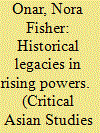|
|
|
Sort Order |
|
|
|
Items / Page
|
|
|
|
|
|
|
| Srl | Item |
| 1 |
ID:
120741


|
|
|
|
|
| Publication |
2013.
|
| Summary/Abstract |
The aim in this contribution is to amplify the call, articulated across a range of disciplines relevant to international politics, for a paradigm shift that decentres the study and practice of Europe's international relations. Such a perspective is necessary both to make sense of our multipolar order and to reconstitute European agency in a non-European world. The analytical categories proposed in this article for a decentring agenda - provincialization, engagement and reconstruction(s) - can help to navigate the nexus of the empirical and the normative in such a decentring process. Applying the decentring logic to the EU's own foundational narrative, the authors suggest that, only by acknowledging the inflections of colonialism in the EU project itself, can the Union reinvent its normative power in the 21st century.
|
|
|
|
|
|
|
|
|
|
|
|
|
|
|
|
| 2 |
ID:
090120


|
|
|
|
|
| Publication |
2009.
|
| Summary/Abstract |
Ottoman claims to universality - embodied in Ottoman imperialism, Ottoman Islam, and Ottoman cosmopolitanism - were undermined and ultimately shattered by the encounter with ascendant Europe. Following near-dismemberment after the First World War, Mustafa Kemal categorically rejected Ottoman universalism in favour of a non-irredentist, secularist nationalism. His brand of Turkish particularism shaped national identity and foreign policy for much of the twentieth century. Since the 1980s, however, a growing number of Turks have begun to revisit the Ottoman past. They are drawn to one or another of the three dimensions of Ottoman universalism which they use to make alternative national and foreign policy claims. This study provides a brief, schematic account of the later years of the Ottoman Empire and early years of the Turkish Republic in order to trace the metamorphosis of Ottoman universalism into Turkish particularism. It then explores how Kemalists, Islamists, liberals, and ultranationalists appropriate Ottoman universalism today in their attempts to redefine national identity and foreign policy.
|
|
|
|
|
|
|
|
|
|
|
|
|
|
|
|
| 3 |
ID:
123369


|
|
|
|
|
| Publication |
2013.
|
| Summary/Abstract |
This articles emanates from the observation that realms like theory and broad comparison have typically focused on Western concerns and geography while actors such as China and Turkey have been relegated to the undervalued field of areas studies. Noting that this inhibits our ability to uncover important cross-regional comparisons, the author suggests that "former empires/rising powers" (FERPs) across (Eur)Asia are a promising unit of analysis. To make the case for the FERPs, the author embeds four cases - Turkey, Iran, Russia, and China - in a common problematique, showing that their encounter with Western hegemony/modernity engendered three waves of confrontation vis-à-vis the legacies of empire. These confrontations entailed Eurocentric denial as well as Occidentalist reification of native pasts, both of which are being superseded by what the author calls "authenticist" histories empowered by the crystallization of multiple modernities. The author then develops a theoretical framework to capture how reinvented pasts serve as sources of identity, normativity, and action. This approach enables an in-depth account of the Turkish case to show that both official and market actors claim continuity with an Ottoman-Islamic heritage from which a homegrown humanism is said to emanate. These narratives - and the tools through which they are promoted from the cultural industries to public diplomacy - may be helping Turkey and other erstwhile (Eur)Asian empires recalibrate national identity and international purpose at a time of global transformation.
|
|
|
|
|
|
|
|
|
|
|
|
|
|
|
|
|
|
|
|
|